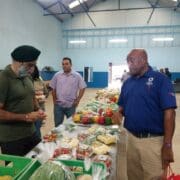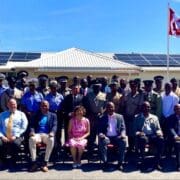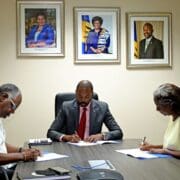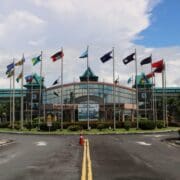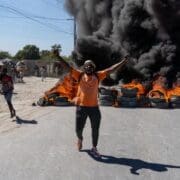Canada’s International Development Minister has high praises for the sustained impact of potato project in Jamaica
Black Immigrant Daily News
Noting the challenges achieving sustainable impact by development projects, Canada’s Minister of International Development Harjit Sajjan was pleased to see the sustainable impact of farmers and market actors reaping successes four years after they recevied support through the Global Affairs Canada funded Promotion of Regional Opportunities for Produce through Enterprises and Linkages (PROPEL) project.
During his visit to Jamaica on January 12, Minister Sajjan, while touring project sites in Glastonbury, Trelawny; Cascade, St Ann and Coleyville in Manchester, noted that the project had exceeded his expectations.
“This project has exceeded my expectations. Just imagine what’s been accomplished with teaching people about using good quality seeds and now they’re able to do second and third planting…rather than just purchasing them, they’re able to now continue to plant and each farmer is doing this so it’s actually creating a really good sustainable opportunity,” he shared.
PROPEL, which was implemented in Jamaica by World University Service of Canada (WUSC) in partnership with the Ministry of Industry, Commerce, Agriculture and Fisheries from 2013-2017, aided in the transformation of Jamaica’s local potato market with the implementation of a potato based economic growth project.
The PROPEL initiative was a J$2 billion (CAD $20 million) undertaking across five countries: Barbados, Dominica, Guyana, Jamaica and Saint Lucia, that was aimed at significantly reducing the Caribbean’s food imports and increasing farmers’ and processors’ access to external markets. Today, the project credits sustained success to the active participation of stakeholders from across the potato market-system, including government officials, research institutions, extension services, private sector input providers, buyers and buyer groups, storage providers, credit institutions, producers and producer groups.
Now, four years later, producers supported through project partners such as Glastonbury Purveyors Co. under the project are still earning livelihoods from their potato crops. The PROPEL model was used to develop the Sustainable Agriculture in the Caribbean (SAC) project, which is also funded by the Government of Canada and is currently being implemented by WUSC Caribbean in five countries: Dominica, Guyana, Jamaica, Saint Lucia and Suriname.
As a part of his visit to Jamaica, Minister Sajjan visited the Glastonbury Purveyors Co. in Manchester, where he met with owner & CEO, Hugh Gentles. Glastonbury was the first private sector firm the PROPEL project worked with in order to pilot the importation of improved quality planting materials and developing interlocking agreements with potatoes producers.
Partly as a consequence of the PROPEL-supported interventions in the potato market system, Jamaica reached its highest level of domestic production of potatoes in 2017 and have had no reported cases of crop failure due to seed quality since 2016. Elite seeds were imported from the Netherlands and Canada based on farmers preferences and used for potato variety trials. This helped to satisfy 70% of local Irish potato consumption.
Minister Sajjan also welcomed the project’s ability to promote sustainable living.
“I love that this project has been able to make a difference for Jamaica. One of the most notable changes is the fact that the country no longer depends solely on imports for products such as potatoes and is now able to produce enough to supply seventy percent of the local market. That for me is a huge accomplishment in regards to sustainability. We want to see more jobs and more means for sustainable livelihoods,” he stated.
Samuel Lynch, a farmer from Lucky Hill St. Mary, who benefitted from the project through Glastonbury Purveyors Co., attested to this impact, noting that his farming business is now able to employ several workers. He received 20 bags of potato in year 1 of the project then a hundred bags in years 2 and 3.
“Before benefiting from this initiative, I felt like giving up on planting Irish potatoes but this project gave me hope and the push I needed to continue. So, I must say thanks to the WUSC Caribbean and Glastonbury team for the support, because without them I would not be farming right now. I am now able to employ several workers who are also grateful for the help,” he said.
According to Minister Sajjan, the data and knowledge gained from the potato programme in Jamaica will aid other efforts within the region.
“Although a major part of my trip is to assess the work that our team has been doing here, we also want to use the opportunity to learn. Everything we’ve learned throughout this project will be a guide to how we implement similar projects not only in the wider Caribbean, but also around the world,” the Minister noted.
Meanwhile, WUSC Caribbean Director, Doug Graham says PROPEL has provided important lessons for the current Sustainable Agriculture in the Caribbean (SAC) project, which addresses gaps in the previous one.
“When we were working on PROPEL, we realised that we weren’t offering enough support to women and youth in agriculture so we decided to implement our current SAC project as a means of addressing that oversight. The project looks at how we can create more opportunities for women and youth in agriculture by providing them with resources and access to knowledge of best agriculture practices that promote climate smart agriculture”, he said.
The current Global Affairs Canada funded SAC project in Jamaica, is currently supporting women, youth and male producers in Jamaica to promote increased productivity and climate smart agricultural practices in the herbs and spices and small ruminants (goats) market systems.
Donate At Caribbean News Service, we do not charge for our content and we want to keep it that way. We are seeking support from individuals and organisations so we can continue our work & develop CNS further.
NewsAmericasNow.com

